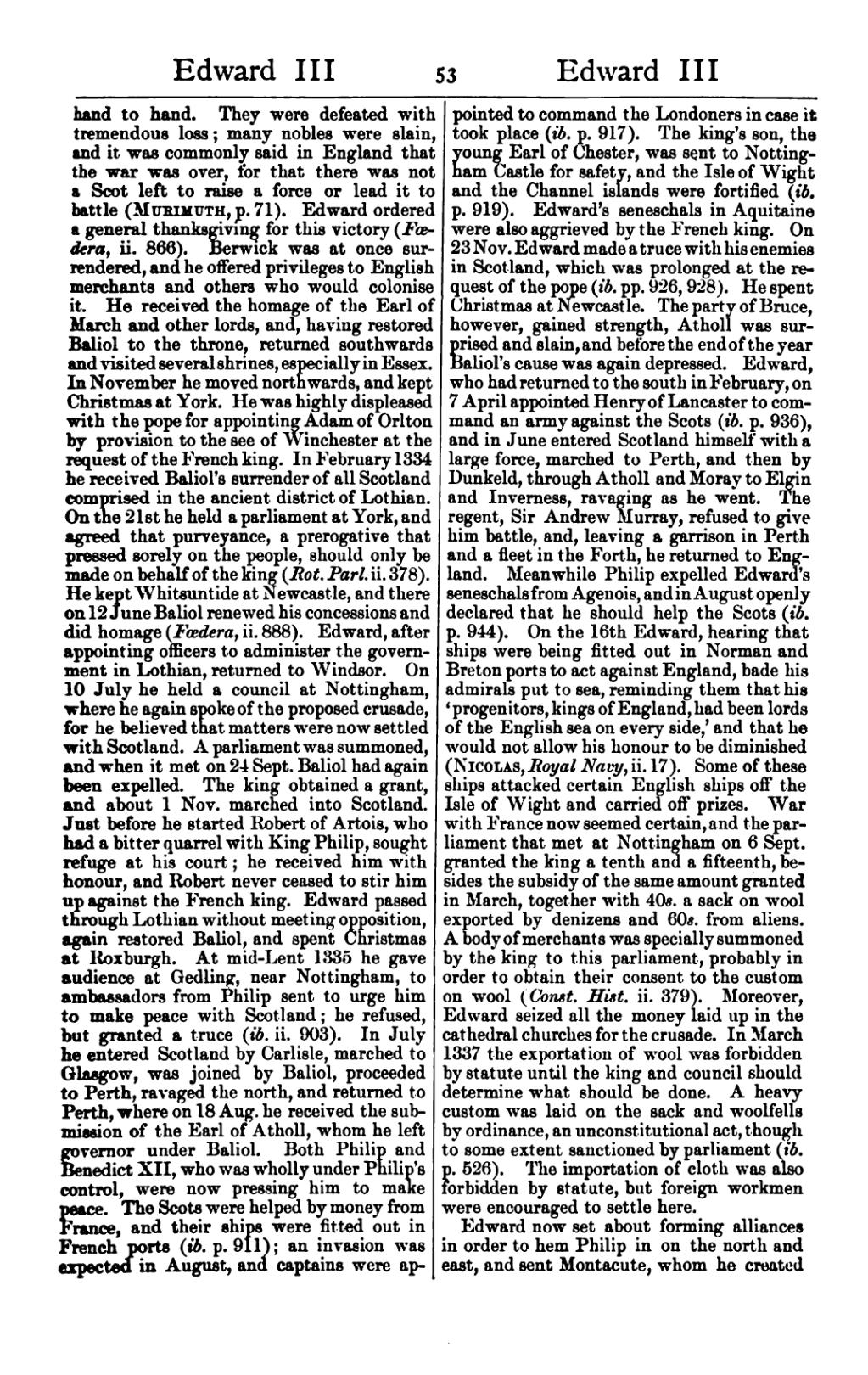hand to hand. They were defeated with tremendous loss; many nobles were slain, and it was commonly said in England that the war was over, for that there was not a Scot left to raise a force or lead it to battle (Murimuth,p. 71). Edward ordered a general thanksgiving for this victory (Fœdera ii. 866). Berwick was at once surrendered, and he offered privileges to English merchants and others who would colonise it. He received the homage of the Earl of March and other lords, and, having restored Baliol to the throne, returned southwards and visited several shrines, especially in Essex. In November he moved northwards, and kept Christmas at York. He was highly displeased with the pope for appointing Adam of Orlton by provision to the see of Winchester at the request of the French king. In February 1334 he received Baliols surrender of all Scotland comprised in the ancient district of Lothian. On the 21st he held a parliament at York, and agreed that purveyance, a prerogative that pressed sorely on the people, should only be made on behalf of the king (Rot. Parl. ii. 378). He kept Whitsuntide at Newcastle, and there on 12 June Baliol renewed his concessions and did homage (Fœdera, ii. 888). Edward, after appointing officers to administer the government in Lothian, returned to Windsor. On 10 July he held a council at Nottingham, where he again spoke of the proposed crusade, for he believed that matters were now settled with Scotland. A parliament was summoned, and when it met on 24 Sept. Baliol had again been expelled. The king obtained a grant, and about 1 Nov. marched into Scotland. Just before he started Robert of Artois, who had a bitter quarrel with King Philip, sought refuge at his court; he received him with honour, and Robert never ceased to stir him up against the French king. Edward passed through Lothian without meeting opposition, again restored Baliol, and spent Christmas at Roxburgh. At mid-Lent 1335 he gave audience at Gedling, near Nottingham, to ambassadors from Philip sent to urge him to make peace with Scotland; he refused, but granted a truce (ib. ii. 903). In July he entered Scotland by Carlisle, marched to Glasgow, was joined by Baliol, proceeded to Perth, ravaged the north, and returned to Perth, where on 18 Aug. he received the submission of the Earl of Atholl, whom he left governor under Baliol. Both Philip and Benedict XII, who was wholly under Philip's control, were now pressing him to make peace. The Scots were helped by money from France, and their ships were fitted out in French ports (ib. p. 911); an invasion was expected in August, and captains were appointed to command the Londoners in case it took place (ib. p. 917). The king's son, the young Earl of Chester, was sent to Nottingham Castle for safety, and the Isle of Wight and the Channel islands were fortified (ib, p. 919). Edward's seneschals in Aquitaine were also aggrieved by the French king. On 23 Nov. Edward made a truce with his enemies in Scotland, which was prolonged at the request of the pope (ib. pp. 926, 928). He spent Christmas at Newcastle. The party of Bruce, however, gained strength, Atholl was surprised and slain, and before the end of the year Baliol's cause was again depressed. Edward, who had returned to the south in February, on 7 April appointed Henry of Lancaster to command an army against the Scots (ib. p. 936), and in June entered Scotland himself with a large force, marched to Perth, and then by Dunkeld, through Atholl and Moray to Elgin and Inverness, ravaging as he went. The regent, Sir Andrew Murray, refused to give him battle, and, leaving a garrison in Perth and a fleet in the Forth, he returned to England. Meanwhile Philip expelled Edward's seneschals from Agenois, and in August openly declared that he should help the Scots (ib, p. 944). On the 16th Edward, hearing that ships were being fitted out in Norman and Breton ports to act against England, bade his admirals put to sea, reminding them that his 'progenitors, kings of England, had been lords of the English sea on every side,' and that he would not allow his honour to be diminished (Nicolas, Royal Navy, ii. 17). Some of these ships attacked certain English ships off the Isle of Wight and carried off prizes. War with France now seemed certain, and the parliament that met at Nottingham on 6 Sept. granted the king a tenth and a fifteenth, besides the subsidy of the same amount granted in March, together with 40s. a sack on wool exported by denizens and 60s. from aliens. A body of merchants was specially summoned by the king to this parliament, probably in order to obtain their consent to the custom on wool (Const. Hist. ii. 379). Moreover, Edward seized all the money laid up in the cathedral churches for the crusade. In March 1337 the exportation of wool was forbidden by statute until the king and council should determine what should be done. A heavy custom was laid on the sack and woolfells by ordinance, an unconstitutional act, though to some extent sanctioned by parliament (ib. p. 526). The importation of cloth was also forbidden by statute, but foreign workmen were encouraged to settle here.
Edward now set about forming alliances in order to hem Philip in on the north and east, and sent Montacute, whom he created
